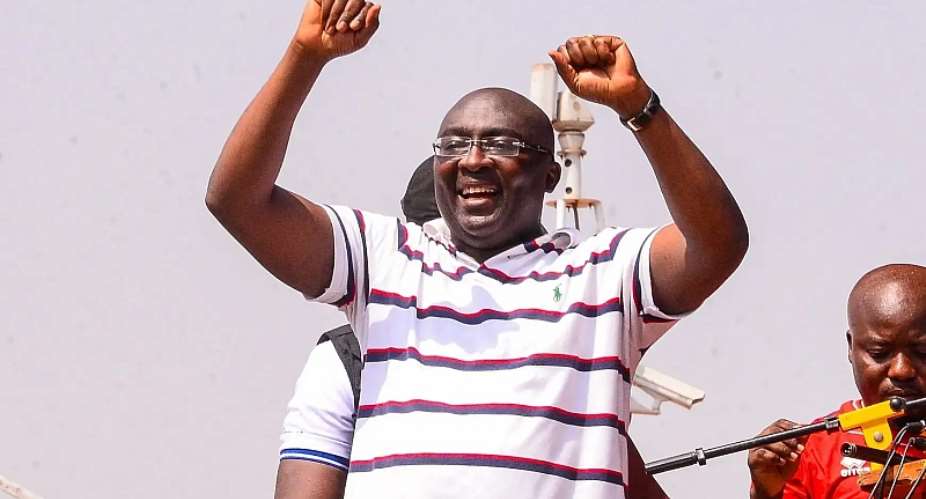By Ebenezer Ato Ntarkurfah Jackson
Dr. Bawumia's slogans and promises have been exposed as deceptive and lacking in substance, emphasizing the urgent need for genuine leadership and accountable governance.
In 2016, Dr. Bawumia, then in opposition, rallied supporters with economic lectures, proclaiming to be an economic messiah encapsulating hopes for many Ghanaians and promising an end to what was deemed as economic incompetence under the Mahama administration.
However, as Ghana faces its current debt crisis, it becomes increasingly evident that Dr. Bawumia's economic lectures amounted to deceptive propaganda, masking the harsh reality of policy failures and mismanagement under his leadership and the NPP administration. Excessive borrowing, lack of clear policy planning, currency vulnerabilities, and deteriorating credit ratings have all contributed to Ghana's financial woes, highlighting the urgent need for strategic reforms under the incoming NDC administration to be led by John Mahama and Naana Jane Opoku Agyemang.
Under Dr. Bawumia's leadership, the NPP administration embarked on a path of excessive borrowing, fueling unsustainable levels of debt. Despite warnings from economists and international institutions, Dr. Bawumia and his NPP government failed to adopt prudent fiscal policies, leading to a ballooning debt-to-GDP ratio. This overreliance on borrowing exemplifies a lack of foresight and strategic planning, laying the groundwork for Ghana's current financial predicament. Today, Ghana cannot go to the international capital market to raise needed funds for economic development.
Another critical factor contributing to Ghana's debt crisis is the absence of a coherent policy plan to limit the size of the government. Dr. Bawumia's administration failed to implement effective strategies to downsize its government, relying instead on unsustainable borrowing to finance government expenditures. This lack of foresight and proactive policymaking further weakened Ghana's fiscal position, exacerbating the debt burden.
The depreciation of the Ghana cedi against major foreign currencies underscores the incompetencies of Dr. Bawumia, exacerbated by poor economic policies and failure to arrest the cedi from depreciating against the United States dollar. Dr. Bawumia's NPP administration neglected to implement adequate monetary policy, leaving Ghana exposed to the adverse effects of exchange rate fluctuations. As a result, the depreciation of the cedi has inflated debt service costs, further straining the burden on the Ghanaian taxpayers' finances.
We must also not forget that Ghana's declining credit ratings reflect a loss of investor confidence in the country's economic management under the Dr. Bawumia-led administration. Fiscal imbalances and unsustainable debt levels have eroded Ghana's creditworthiness, leading to capital outflows and restricted market access. This downward spiral in investor confidence exacerbates Ghana's debt crisis, highlighting the urgent need for comprehensive reforms.
Ghana's debt crisis is primarily a consequence of internal economic mismanagement and policy failures under the Dr. Bawumia-led NPP administration. Excessive borrowing, lack of clear policy planning, and currency vulnerabilities have all contributed to Ghana's precarious financial situation. As the country transitions to a new administration led by John Mahama in January 2025, strategic reforms are essential to restoring fiscal sustainability, rebuilding investor confidence, and putting Ghana back on track towards sustainable development.
Ebenezer Ato Ntarkurfah Jackson, Cornell University, Johnson School of Business, Class of 2015, [email protected]





 Azumah Nelson faces Irchad Razaaly in a match to empower youth
Azumah Nelson faces Irchad Razaaly in a match to empower youth
 Ejisu By-Election: I’m not a traitor, NDC people appreciate me – Independent can...
Ejisu By-Election: I’m not a traitor, NDC people appreciate me – Independent can...
 Some people expect us to be dogmatic, sycophantic supporters of Akufo-Addo even ...
Some people expect us to be dogmatic, sycophantic supporters of Akufo-Addo even ...
 NDC Campaign: James Agyenim Boateng is the right man to handle communications
NDC Campaign: James Agyenim Boateng is the right man to handle communications
 Mahama pledges to contribute to the development of Gonja Kindom
Mahama pledges to contribute to the development of Gonja Kindom
 “Ghanaman Time”: We've normalized the abnormal, accepted the unacceptable — Dots...
“Ghanaman Time”: We've normalized the abnormal, accepted the unacceptable — Dots...
 Bawumia begins nationwide campaign, starts in Eastern Region today
Bawumia begins nationwide campaign, starts in Eastern Region today
 Bawumia kicks off nationwide campaign with “bold solutions” for Ghana's future
Bawumia kicks off nationwide campaign with “bold solutions” for Ghana's future
 You cannot choose your successor; it’s only God who can – Mahama to Akufo-Addo
You cannot choose your successor; it’s only God who can – Mahama to Akufo-Addo
 Ejisu by-election: Vote for independent candidate Kwabena Owusu Aduomi to uphold...
Ejisu by-election: Vote for independent candidate Kwabena Owusu Aduomi to uphold...
